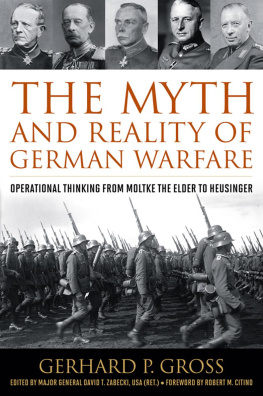
This edition is published by PICKLE PARTNERS PUBLISHINGwww.picklepartnerspublishing.com
To join our mailing list for new titles or for issues with our books picklepublishing@gmail.com
Or on Facebook
Text originally published in 1958 under the same title.
Pickle Partners Publishing 2015, all rights reserved. No part of this publication may be reproduced, stored in a retrieval system or transmitted by any means, electrical, mechanical or otherwise without the written permission of the copyright holder.
Publishers Note
Although in most cases we have retained the Authors original spelling and grammar to authentically reproduce the work of the Author and the original intent of such material, some additional notes and clarifications have been added for the modern readers benefit.
We have also made every effort to include all maps and illustrations of the original edition the limitations of formatting do not allow of including larger maps, we will upload as many of these maps as possible.
THE GERMAN RESISTANCE: CARL GOERDELERS STRUGGLE AGAINST TYRANNY
BY
GERHARD RITTER
Translated by R. T. Clark
TABLE OF CONTENTS
Contents
TABLE OF CONTENTS
REQUEST FROM THE PUBLISHER
FOREWORD {1}
IT WOULD take a good many pages to name all the people who have helped me with information, often very detailed information, and accompanied by documents; no one from whom I asked ever refused. I take this opportunity of expressing to them all my warmest thanks. I only regret that it was not possible to make full use in this book of all the information which I got; it is not intended to be as complete a book as possible, an enumeration of all the Resistance fighters, and an estimate of the part each played, but to be a history of the Resistance movement as a whole, grouped round a leading figure against the background of the history of the Third Reich. I have, for instance, not told again the story in detail of July 20, 1944, not merely because Goerdeler was not directly concerned in it, but also because to have done so would have been to exceed the limits set for this book.
No professional historian who concerns himself with the most recent past in which he himself lived, will do so lightheartedly. It is hard in so narrow a space of time to see things as a whole or to estimate the true historical significance of the details. It is painful and often disillusioning to deal with source-material which is still, so to speak, a floating mass and, steadily accumulating, makes ones work seem to get out of hand. But thereby the lesson is forced on one how from incidents history grows; out of the misunderstandings, misinterpretations and half-truths of political writing,which so seldom is wholly true yet is so overwhelmingly effective politically,hardening by time into legend; through the accusations and apologies made by those engaged in the conflict which lead to exaggeration and error until everything seems covered in thick dust-clouds which conceal what really did happen. To understand what did happen in its real context, to create a picture out of little pieceslike those small stones of which a mosaic is madewhich is, at least, in its basic elements enduring, is a toilsome business; often when I was engaged on it I thought it the most toilsome I had ever undertaken in my literary life. But assuredly it was also the most moving, demanding all ones most human perception, exciting and even stimulating. For how could a book like this be written dispassionately? Whether personal feeling and personal experience has hindered sober critical judgements the reader must decide.
In any case the historian must not wait until the legend is established. He must seek to shape the historical picture of our times even if he runs the risk of becoming subconsciously involved in the political struggle he describes, of re-opening wounds that have barely healed, and of raising against him angry protests from more than one side, for he cannot escape speaking from a political and moral viewpoint and confessing where he stands.
TRANSLATORS NOTE
TO BRING Prof. Ritters big book down to a size suitable for publication here, the translator was entrusted with the task of greatly reducing its bulk. This has been done by omitting the appendices, by confining the annotation to references to sources and to important additional information about the conspiracy which is given in it, by some omission and by compression. Anyone who has ever tried to translate a work by Prof. Ritter will be well aware of the dangers and difficulties involved. I can only hope that I have omitted nothing of first-class relevance or misinterpreted an author with so individual a style and such sensitiveness of appreciation.
I have added to the index identification of the persons mentioned which will, I hope, be useful to readers who have forgotten events which at the time were to people here as mysterious as they were intriguing.
INTRODUCTION
THE HISTORY of the German Resistance movement poses a historical as well as a political problem. Reflection upon it constitutes an inescapable part of that political self-appraisal which we Germans are required to undertake by this most awful of the long series of catastrophes which have plagued our history. Why is it necessary and important to revive its memory time and again? It would be dubious if we did so only or principally in order to take comfort in the fact that by no means all Germans sacrificed to the great Baal; for in all too many cases that would amount to a mere suppression of a guilty conscience, and would on the whole contribute more to a stubborn and callous national self-righteousness than to a firm and healthy national self-assurance. This self-assurance, already beginning to reawaken after a period of total confusion and insecurity, must at all costs be kept away from a renewed commitment to false concepts of honour and ideas of power. It is simply not true that the power-political interests of the nation can gloss over the fundamental difference between right and wrong; on this point the testimony of the Resistance movement against Hitler is eloquent. It is simply not true that the solidarity of the national community is superior to all other human and moral obligations, that it constitutes a moral non plus ultra before which all other moral values should pale into insignificance. Right or wrong, my country {2} not even in wartime, when the survival of the state is at stake, can that slogan claim to go unchallenged as the supreme law. There can be no national honour where no distinction is made between good and evil; there can be national honour only where a people and a state prove their worth by moral accomplishments too. If we try today to build a new political community on the ruins of Hitlers Reich, then it is all-important that it shall not again be a community based on brutal national ambition and a ruthless quest for power, but rather an ethical community, founded in internal affairs on a respect for the dignity and freedom of the human personality and in foreign affairs on a respect for the vital interests of other nations.
There was, to be sure, a time, immediately after the great catastrophe when it seemed urgent to confront public opinion abroad, filled with hate and a desire for revenge, with proof that not the whole German people was deserving of such hate or even of the reproach of mere cowardly servility; that, on the contrary, a distinction had to be made between the blind followers of Hitler and another, a better Germany, whose leading spirits became victims of Hitlers executioners. Today, however, it appears more important to make known the political ideas, guiding the German Resistance movement, and the moral and religious convictions which lay behind them. For here in truth are revealed ideals of a new and better Germany and a new and better Europe whose intrinsic merit will survive their progenitors. The spirit of these men, the moral and political opinions which drove them into opposition, must be kept alive among us too, if our own work of reconstruction is to prosper.













